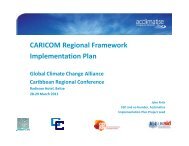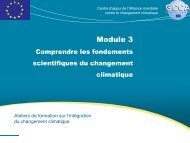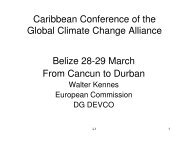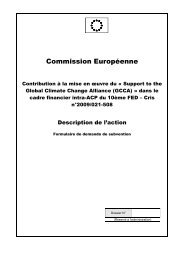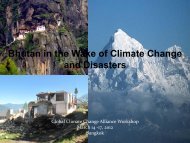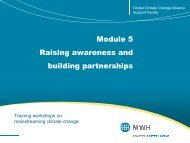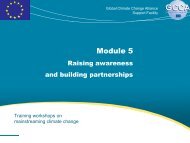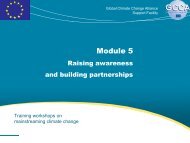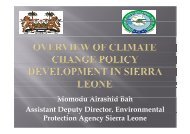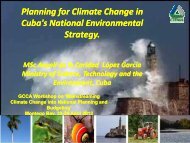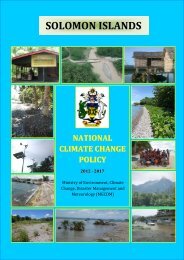Rwanda Green Growth Strategy 18nov11 - Global Climate Change ...
Rwanda Green Growth Strategy 18nov11 - Global Climate Change ...
Rwanda Green Growth Strategy 18nov11 - Global Climate Change ...
You also want an ePaper? Increase the reach of your titles
YUMPU automatically turns print PDFs into web optimized ePapers that Google loves.
Detailed Programmes of ActionProgramme 13: Disaster Management and Disease PreventionResponsible Stakeholders (lead in bold)MIDIMAR, MINALOC, MOH, <strong>Rwanda</strong> Meteorological Service, District and Sub-District authorities,MINAGRI, Disaster Management Task ForceSummary of Programmes and Actions<strong>Rwanda</strong> is vulnerable to a range of disasters and emergency situations. The hilly topography and highannual precipitation rates bring high risks from flooding, storms, landslides and vector-borne disease, whileother natural disasters include droughts and earthquakes, all of which can directly impact on health andfood security. Over-exploitation of the natural environment such as deforestation and inappropriate farmingon steep slopes increases the hazard risk, which may be exacerbated through climate change as anincrease in extreme weather patterns occurs. There is a requirement for contingency planning to deal withincidents such as disease outbreaks, hydro-dam failures, refugee movements and environmentalcontamination. Action 1: Risk Assessment and Vulnerability Mapping<strong>Rwanda</strong> will conduct risk assessments and vulnerability mapping to develop effective disaster managementsystems. This will include health impact assessments for water-related infrastructure projects such as damsand irrigation where disease may spread. Timely risk assessment is crucial to disaster prevention as itenables disaster preparedness planning and mitigation activities, such as the protection of fragile ecologicalzones including steep slopes and flood prone areas like wetlands. Vulnerability mapping will build planningcapacity and allow for rapid response and resource allocation based on sector activity and geographicalprioritization of risk and vulnerability. Action 2: Integrated Early-Warning SystemAn early-warning system (EWS) for <strong>Rwanda</strong> has been proposed and the <strong>Rwanda</strong>n Meteorological Service(RMS) has produced an initial scoping report. There are also a number of regional warning systems, forexample, relating to food security, famine and malaria. <strong>Rwanda</strong> will develop an EWS alongside these existingsystems in order to foster complementary systems and avoid duplication. The EWS will require thedevelopment of environmental monitoring and data collection tools to understand thresholds and triggers fordisasters and emergencies. This action will be conducted in partnership with RMS. Action 3: Disaster Mitigation, Preparedness and Response PlanningThe impacts of disasters in terms of loss of human life and economic losses can be greatly reduced throughdisaster preparedness and response planning. Such approaches require effective communication across theministries and local government to ensure each sector has appropriate contingency plans in place to dealwith a range of hazards. <strong>Rwanda</strong> will implement contingency plans to address disaster mitigation, e.g. lawsgoverning settlement planning and building regulations to enforce safe construction and reduced risk fromstorm and flood damage; disaster preparedness, e.g. early warning systems; and disaster response, e.g.action plans for communicable disease outbreaks such as cholera. It will also continue to support pilotprojects of weather index-based crop insurance to address the risk of drought. Action 4: Community-Based Disaster Risk ReductionDRR consists of a wide-range of activities that aim to both reduce the socio-economic vulnerabilities todisasters, and deal with hazards, environmental and otherwise, which result in disaster and emergencysituations. Such programmes require effective community mobilization and participation in order to buildlocal capacity in risk reduction and in disaster response. <strong>Rwanda</strong> will implement the following communitybasedDRR activities: improved farming techniques that mitigate flood and landslide impacts; first aidtraining; and environmental and public health awareness for disease prevention, particularly following floodand storm episodes when the spread of water-borne disease is high.80Government of <strong>Rwanda</strong>



